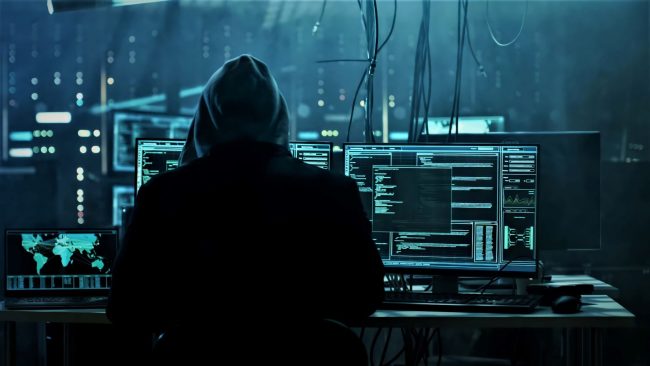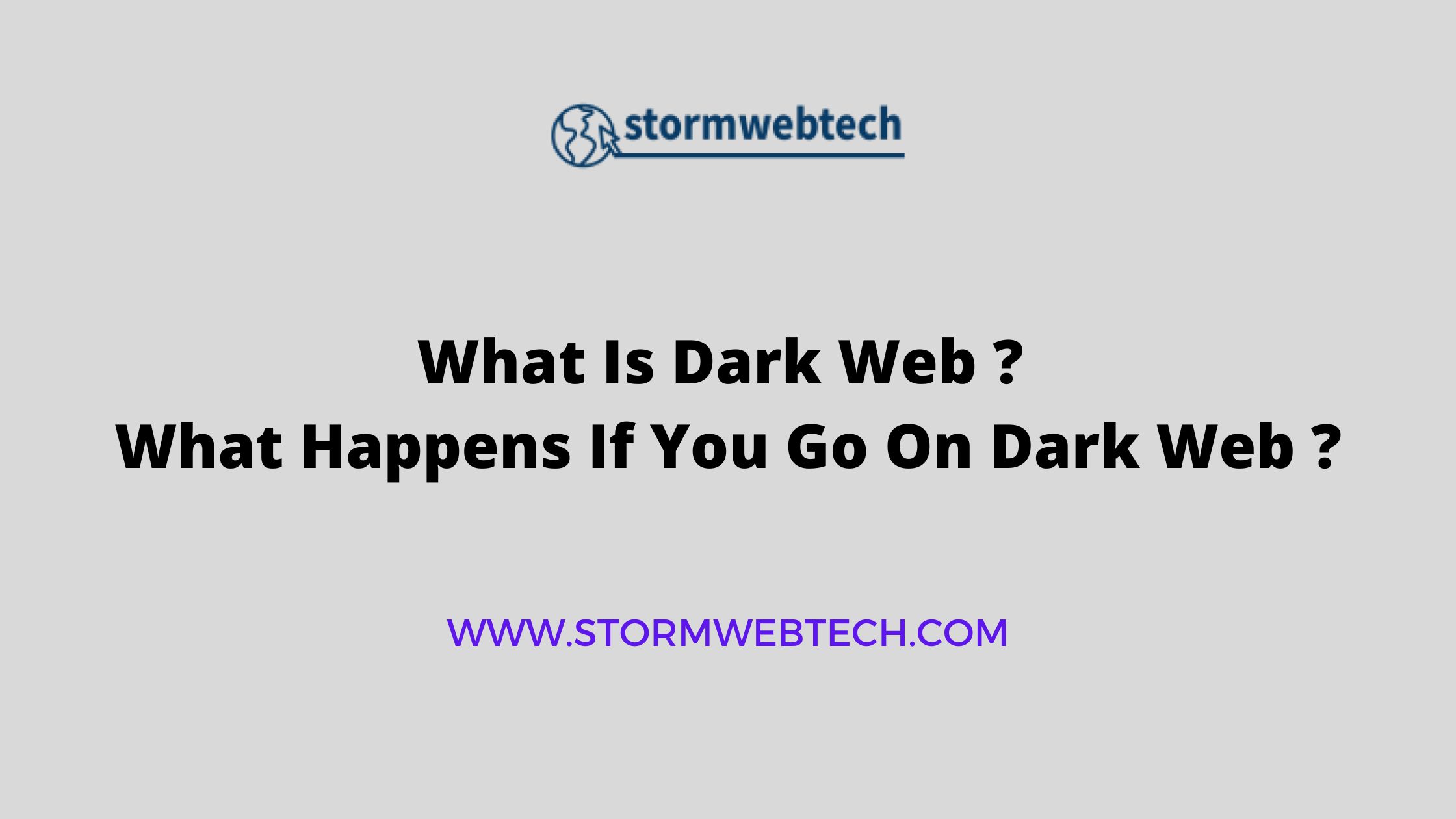Let’s read About What Is Dark Web ?, What Is Dark Web Used For ?, What Happens If You Go On Dark Web ?, What Is Dark Web In Cyber Security ?, How Does Dark Web Works ?, Essential Safety Tips For Dark Web.
In today’s interconnected world, the Internet has become an integral part of our lives. It serves as a platform for communication, entertainment, and information sharing. However, beneath the surface of the visible Internet lies a mysterious and notorious realm known as the Dark Web. In this blog post, we will embark on a detailed exploration of theWhat Is Dark Web, What Happens If You Go On Dark Web, shedding light on its definition, structure, activities, and the implications it carries.
What Is Dark Web ?
The Dark Web refers to a part of the Internet that exists on overlay networks, accessible only through specific software and configurations, most commonly through the Tor network. Unlike the surface web that can be indexed and accessed by search engines, the Dark Web is intentionally hidden and anonymous, facilitating a high degree of privacy for its users. It is important to note that while the Dark Web has legitimate purposes, it also harbors illegal activities.
The dark web is known for its anonymity and encryption features, which make it difficult to trace the identity or location of its users. It is often associated with illegal activities, such as the sale of drugs, weapons, stolen data, and hacking tools. However, it’s important to note that not all activities on the dark web are illegal, as it can also provide a platform for whistleblowers, journalists, and individuals seeking privacy in repressive regimes.
The dark web is a part of the internet that is not indexed by traditional search engines and requires specific software or configurations to access. It is a subset of the deep web, which includes all web pages that are not indexed by search engines.
Accessing the dark web typically involves using specialized software like Tor (The Onion Router), which routes internet traffic through a network of volunteer-operated servers to maintain anonymity. This anonymity, while offering protection for legitimate users, also attracts criminal elements who exploit it for illegal purposes.
It’s crucial to exercise caution when accessing the dark web, as engaging in illegal activities or interacting with malicious individuals can have serious legal and ethical consequences.
The Tor Network
The primary gateway to the Dark Web is the Tor network, short for “The Onion Router.” Tor uses a layered encryption system to anonymize user traffic, bouncing it through a series of volunteer-run servers, making it difficult to trace the source. The network relies on a vast number of relays to ensure the anonymity and privacy of its users.
The Dark Web Structure and Components
The Dark Web comprises several components, each serving a specific purpose :
Hidden Services : Websites on the Dark Web are called hidden services. They use Tor’s unique addressing system, including .onion domains, to remain anonymous. These websites can offer various types of content, ranging from legal platforms like anonymous forums and whistleblowing sites to illicit marketplaces and hacking forums.
Darknet Marketplaces : Perhaps the most infamous aspect of the Dark Web is its illegal marketplaces. These marketplaces facilitate the buying and selling of drugs, weapons, stolen data, counterfeit goods, and other illicit items. Transactions are often conducted using cryptocurrencies like Bitcoin to maintain anonymity.
Online Anonymity : The Dark Web provides an environment where individuals can protect their identities and communicate securely. Whistleblowers, journalists, activists, and people living under oppressive regimes may leverage the Dark Web to share information anonymously.
Dark Web and Cybersecurity
The Dark Web presents unique challenges to cybersecurity. It serves as a breeding ground for cybercriminals who engage in activities such as hacking, selling malware, stolen data, and launching DDoS attacks. Additionally, the Dark Web provides a platform for the exchange of hacking techniques, tutorials, and tools, amplifying the potential threats to cybersecurity.
Legal and Ethical Implications
The Dark Web poses significant legal and ethical concerns. While anonymity can be crucial for free speech and privacy, it also facilitates illegal activities, including drug trafficking, human trafficking, weapons sales, and the dissemination of child pornography. Law enforcement agencies around the world face challenges in identifying and prosecuting criminals operating on the Dark Web.
Balancing Privacy and Security
The existence of the Dark Web raises important debates about the balance between privacy and security. While it offers individuals a way to protect their identities and exercise free speech, it also serves as a breeding ground for criminal activities. Striking a balance between preserving privacy and ensuring public safety is an ongoing challenge for governments and societies worldwide.
What Is Dark Web Used For ?
The dark web is a part of the internet that is not indexed by search engines and requires specific software or configurations to access. It is often associated with illegal activities, but it is important to note that not everything on the dark web is illegal, and it does serve legitimate purposes as well. Here are some common uses of the dark web :
Privacy and Anonymity : The dark web provides a platform for individuals who seek enhanced privacy and anonymity online. It allows users to browse websites without revealing their identities or locations, which can be useful for individuals living under repressive regimes or whistleblowers.
Journalists and Activists : The dark web can be a resource for journalists and activists working in sensitive areas or investigating topics that might attract unwanted attention. It can provide a means for secure communication, data sharing, and research.
Tor Hidden Services : The dark web hosts websites that are accessible only through the Tor network, which encrypts and anonymizes internet traffic. These Tor hidden services can provide platforms for discussion, forums, blogs, and even e-commerce sites. While some of these sites may be used for legitimate purposes, others may offer illegal goods or services.
Marketplaces : The dark web has gained notoriety for hosting various online marketplaces where illegal goods and services are bought and sold, such as drugs, weapons, counterfeit documents, stolen data, hacking tools, and more. These marketplaces operate using cryptocurrencies for added anonymity.
Whistleblowing Platforms : The dark web offers platforms for whistleblowers to anonymously share sensitive information, leaks, or documents that could expose corruption, abuse, or illegal activities. These platforms aim to protect the identity of the whistleblower and maintain the confidentiality of the information shared.

What Happens If You Go On Dark Web ?
The dark web refers to a portion of the internet that is intentionally hidden and inaccessible through standard web browsers. It operates using encrypted networks and requires specific software configurations to access. While the dark web itself is not inherently illegal, it does host a range of illicit activities and content, making it a potentially risky place to explore.
If you venture onto the dark web, you may encounter various illegal activities, such as illegal marketplaces for drugs, weapons, counterfeit documents, stolen data, hacking tools, and more. There are also forums and communities dedicated to discussing and sharing illegal content, including child pornography, extremist ideologies, and other harmful materials.
Engaging in such activities or attempting to purchase illegal items can have severe legal consequences. Law enforcement agencies actively monitor the dark web, and if they suspect illegal activities or identify individuals involved, they may initiate investigations and take legal action.
Additionally, the dark web presents various cybersecurity risks. It is populated with hackers, scammers, and malicious actors who can attempt to exploit vulnerabilities in your system, steal personal information, or infect your device with malware. These risks make it unwise for most individuals to venture onto the dark web without the necessary expertise and precautions.
If you choose to venture onto the dark web, there are several potential consequences and risks to be aware of What Happens If You Go On Dark Web :
Illegal activities : The dark web is known for facilitating the sale of illegal goods and services, including drugs, weapons, stolen data, hacking tools, counterfeit documents, and more. Engaging in or supporting these illegal activities can result in criminal charges.
Cybercrime : The dark web is home to various cybercriminals who specialize in hacking, identity theft, ransomware, and other malicious activities. These individuals may try to exploit vulnerabilities in your system or attempt to scam you.
Exposure to disturbing content : The dark web hosts websites with explicit, violent, or otherwise disturbing content that may be illegal in many jurisdictions. Encountering such content can be psychologically distressing.
Privacy and security risks : While the dark web provides anonymity, it doesn’t guarantee complete privacy or security. Law enforcement agencies, as well as hackers, actively monitor dark web activities. There have been cases where users have been identified and arrested for their actions on the dark web.
Malware and viruses : The dark web is filled with websites that may contain malware or viruses designed to infect your device. These malicious programs can compromise your security, steal personal information, or even render your device inoperable.
Social engineering and scams : Dark web forums and marketplaces can be rife with scammers and individuals looking to deceive others. Be cautious of phishing attempts, fraudulent sales, and attempts to gather personal information.
It is important to emphasize that the vast majority of internet users have no legitimate reason to access the dark web. Exploring it out of curiosity is highly discouraged due to the potential legal and cybersecurity risks involved. It is best to prioritize using the internet safely and responsibly within the bounds of the law. Engaging in illegal activities or seeking out illicit content can have severe legal and personal consequences. If you encounter any illegal activities or content while using the internet, it is recommended to report them to the appropriate authorities.
What Is Dark Web In Cyber Security ?
The dark web, in the context of cybersecurity, refers to a part of the internet that is intentionally hidden and not easily accessible through regular search engines. It is a network of websites and services that are hosted on encrypted networks, such as Tor (The Onion Router) or I2P (Invisible Internet Project), which provide anonymity to users.
The dark web is often associated with illegal activities because it provides a platform for individuals to engage in various illicit practices, such as selling and buying drugs, weapons, stolen data, hacking tools, and counterfeit documents. Additionally, it is also used for activities like hacking forums, illegal pornography, and other forms of cybercrime.
From a cybersecurity perspective, the dark web poses several challenges. It serves as a marketplace for cybercriminals to exchange tools, services, and information, which can facilitate cyber attacks on individuals, organizations, and even governments. Stolen data, including personal information and login credentials, are often traded and sold on the dark web, contributing to identity theft and fraud.
Furthermore, the dark web provides a platform for cybercriminals to communicate and collaborate, making it difficult for law enforcement agencies to track and apprehend them. They can operate anonymously, using pseudonyms and encryption techniques to hide their identities and activities.
The dark web is associated with illegal activities, not everything on the dark web is illegal. There are legitimate use cases for anonymity and privacy, such as whistleblowing or accessing information in countries with strict censorship. However, caution is advised when accessing the dark web, as it can expose users to various risks, including malware, scams, and surveillance.

How Does Dark Web Works ?
The dark web is a part of the internet that is intentionally hidden and inaccessible through traditional search engines. It operates on encrypted networks and relies on anonymity tools like Tor (The Onion Router) to protect users’ identities. Here’s a simplified explanation of how does dark web works :
Encryption and Anonymity : Dark web users employ specialized software like Tor to access websites. Tor encrypts and routes internet traffic through a network of volunteer-operated servers, concealing the user’s IP address and making it difficult to track their online activities.
Layered Routing : Tor uses a layered routing mechanism, where data is encrypted and transmitted through a series of relays, or nodes. Each relay only knows the IP address of the previous relay and the next relay, ensuring that no single relay can trace the complete path of data.
Hidden Services : Dark web websites are called “hidden services” and use Tor’s onion routing to maintain anonymity. These websites have addresses that end in “.onion” and are not accessible through regular browsers. Users must use Tor to access them.
Silk Road Model : The Silk Road was one of the most well-known dark web marketplaces. It operated as an anonymous platform for buying and selling various goods and services. Buyers and sellers conducted transactions using cryptocurrencies like Bitcoin, which further enhanced anonymity.
Cryptocurrency Usage : Cryptocurrencies play a significant role in dark web transactions. Bitcoin, for example, is commonly used due to its pseudo-anonymous nature. It allows users to make transactions without revealing their true identities. Other cryptocurrencies like Monero provide even greater privacy and are preferred by some dark web users.
Risks and Illicit Activities : While the dark web can be used for legitimate purposes such as anonymous communication and bypassing censorship, it also harbors illegal activities. These can include the sale of drugs, stolen data, hacking tools, counterfeit goods, weapons, and other illicit services. However, it’s important to note that the dark web is not solely dedicated to illegal activities.
Essential Safety Tips For Dark Web
The dark web is an anonymous and hidden part of the internet that poses significant risks to unsuspecting users. While it can be tempting to explore this mysterious realm, it’s crucial to prioritize your safety and security. We’ll discuss essential advice to help you navigate the dark web cautiously.
Understand the Risks : Before venturing into the dark web, it’s essential to acknowledge the potential risks involved. The dark web is home to illegal activities, including hacking, illegal marketplaces, and other illicit content. Law enforcement agencies actively monitor these platforms, and engaging in illegal activities can have severe legal consequences.
Anonymity is Key : Protecting your identity is crucial when accessing the dark web. Use a reliable Virtual Private Network (VPN) to mask your IP address and encrypt your internet traffic. This adds an extra layer of security and makes it more challenging for anyone to trace your online activities back to you.
Tor Browser : The Tor Browser is the most common tool used to access the dark web. It enables anonymous browsing by routing your internet connection through multiple relays, making it difficult to track your location and online activities. Download the Tor Browser only from the official website to avoid potential malware or scams.
Keep Your System Secure : Maintaining a secure system is vital when accessing the dark web. Ensure your operating system, antivirus software, and other security tools are up to date. Regularly update your browser and enable automatic security patches to minimize vulnerabilities.
Exercise Caution : Exercise extreme caution when exploring the dark web. Avoid clicking on suspicious links or downloading files from unknown sources, as they can contain malware or malicious content. Stick to well-known and reputable websites if you choose to explore.
Avoid Personal Information : Never provide personal information, such as your real name, address, or financial details, on the dark web. Assume that anyone you encounter is a potential threat, and maintaining anonymity should be your top priority.
Use Cryptocurrency : Cryptocurrencies like Bitcoin are commonly used for transactions on the dark web. If you plan to make purchases, use cryptocurrencies for added anonymity. However, be aware of the associated risks and potential scams when dealing with cryptocurrency transactions.
Trust Your Instincts : If something feels off or too good to be true, trust your instincts and exit immediately. The dark web is filled with scams and fraudulent schemes designed to exploit unsuspecting users. Be skeptical and avoid engaging in anything that raises red flags.
It’s crucial to understand that accessing or engaging in illegal activities on the dark web is against the law and unethical. The dark web poses significant risks, including exposure to scams, malware, hacking attempts, and potential legal consequences.
The Dark Web represents a hidden facet of the Internet that both intrigues and alarms. It offers a cloak of anonymity for individuals seeking privacy and protection but also harbors illegal activities that pose significant threats. Understanding the Dark Web is crucial for comprehending the evolving landscape of the digital world, enabling us to navigate its complexities while addressing the associated legal, ethical, and cybersecurity challenges.
Thank You For Reading About What Is Dark Web In Cyber Security ?, What Is Dark Web ?, What Is Dark Web Used For ?, What Happens If You Go On Dark Web ?, How Does Dark Web Works ?, Essential Safety Tips For Dark Web.
Read More -:
